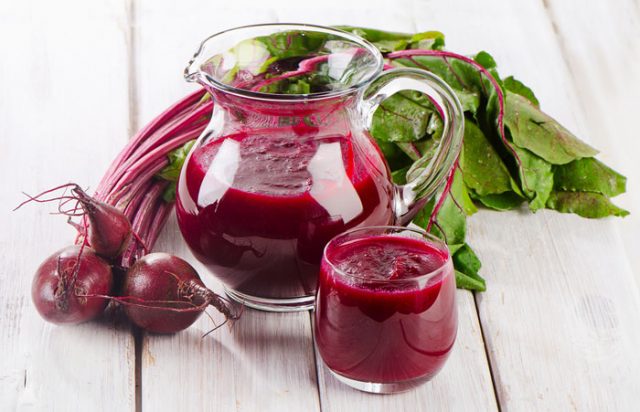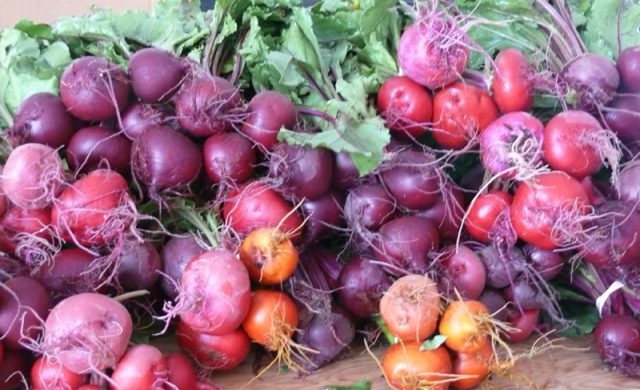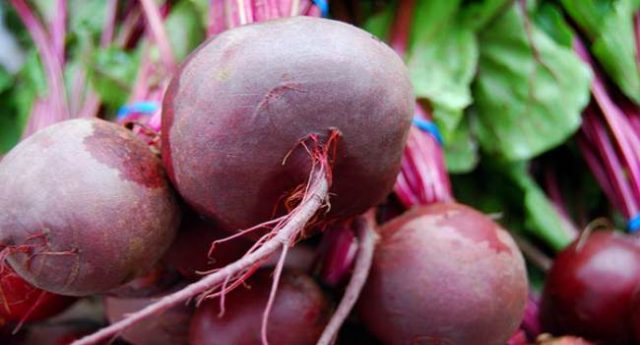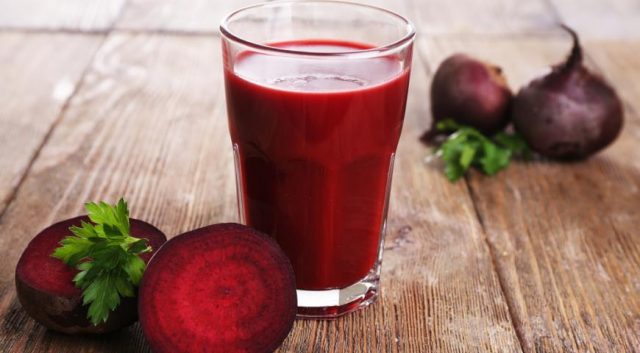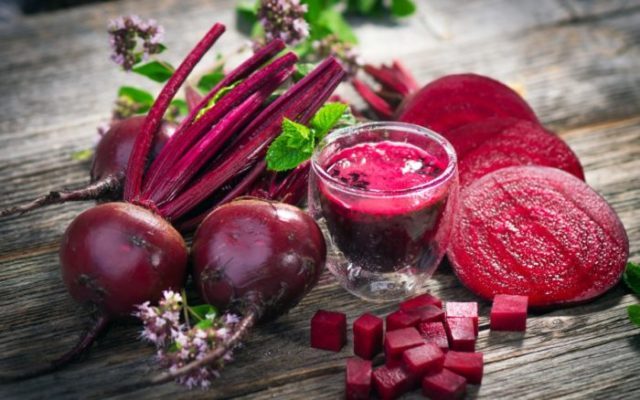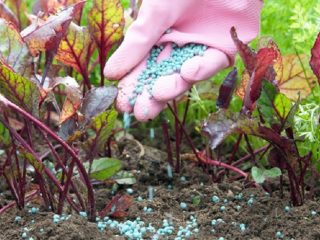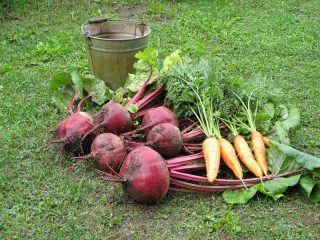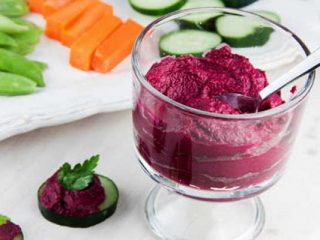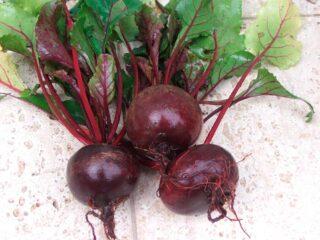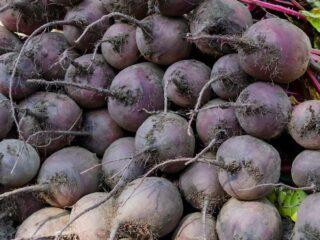Content
Beetroot of table varieties is a food product known to almost every Russian resident, traditionally used for preparing all kinds of everyday or holiday dishes. This vegetable with a characteristic burgundy color gives dishes a unique taste and certain beneficial properties. The health benefits and harms of beets for people of all ages have long been known; they can serve not only for nutrition, but also be a good medicine that can be used to treat and prevent certain diseases.
Composition and nutritional value of red beets
There are very few proteins, fats and carbohydrates in red beets, as in other vegetables. For example, 100 g of root vegetables contains only 1.5 g of protein, 8.8 g of carbohydrates and 0.1 g of fat. They contain 2.5 g of fiber and 86 g of water, and contain pectin compounds and acids of organic origin.
The nutritional value and benefits of beets lie in the carbohydrates, proteins and fats that enter the body as a result of their consumption, as well as in the vitamin compounds and mineral elements that they contain.
Vitamin content
Vitamins in red beets are represented by ascorbic acid, beta-carotene and its derivative retinol, nicotinic acid, several compounds from group B (B1, B2, B4, B5, B6, B9), tocopherol, phylloquinone and niacin.
There are also enough macro- and microelements in the vegetable, these are K, Ca, Mg, Na, S, Ph, Cl, B, V, Fe, I, Co, Mn, Cu, Mo, Ni, Rb, Se, F, Cr and Zn. From this list, the vegetable contains the most elements such as potassium, cobalt, manganese, copper, chromium, and molybdenum.
How many calories are in beets
Like all vegetables, red beets are not very nutritious: raw calories are only 42 kcal. If you boil it, the calorie content will increase, but only slightly. It is noted that the nutritional value of the boiled root vegetable is 47 kcal.
What are the benefits of raw beets?
The undoubted benefits of raw beets for the body and maintaining health were noted by our ancestors in the past. It was primarily used as an affordable and popular food product, but also as an excellent medicinal home remedy that was always at hand. The medicinal and beneficial properties of raw beets are that they:
- prevents blood diseases resulting from a decrease in hemoglobin concentration;
- rejuvenates all body tissues, promoting the replacement of old, worn-out cells with new ones;
- increases appetite, stimulates digestion, enhances intestinal motility;
- removes accumulated toxins and harmful compounds;
- prevents the occurrence and development of tumors (thanks to anthocyanins - coloring substances that give it a characteristic red-burgundy color);
- frees blood vessels from cholesterol accumulations, makes them more elastic, thereby helping to prevent the development or treat existing atherosclerosis or hypertension;
- enhances potency;
- reduces the severity of menstrual pain in women;
- has unexpressed diuretic and laxative effects;
- relieves pain and relieves inflammation of various natures.
Raw beets increase physical and mental endurance, raise vital energy, have a positive effect on visual acuity, help in the treatment of thyroid pathologies caused by iodine deficiency, and also improve mood and treat mild depression.
Raw, unheated beets are useful for those people who have a severe lack of vitamin C, which causes the gums to become loose and bleed, and capillary and even nosebleeds occur. Many nutritionists also note the benefits of beets for the human body - they claim that it can normalize metabolism, and therefore can be included in diets for gradual weight loss.
Raw beets are also beneficial for the body because they cleanse the liver, gall bladder and kidneys, and help improve the functioning of these organs. Vegetable substances improve blood composition, prevent blood clots from forming, and lower blood pressure. Thanks to this, the root vegetable is useful for those people who have heart or circulatory system diseases or impaired biochemical composition of the blood.
Other benefits of beets include improving vision, treating inflammation of the mucous membranes of the nose and throat, gynecological and metabolic diseases, and pathologies of the digestive system.The vegetable is also suitable for the prevention of all these disorders.
What are the benefits of beets for the body?
Raw beets can be consumed in small quantities at least every day. The easiest way is to grate a small piece of the root vegetable and eat it just like that, without additional food. This way, all the vitamins from it will be completely preserved, and the result will be maximum.
For men
Raw beets are useful for men because they prevent the development of prostate diseases, for example, benign hyperplasia or adenoma. This is especially true for men over 50 years old - at this age many of them begin to have problems of this kind. Beets contain substances that stop tumor growth or prevent its appearance. This becomes possible thanks to zinc, which it contains 0.425 mg per 100 g. In addition, beets cleanse the blood and remove toxins, which also helps maintain men's health. But in order for beets to work effectively, you need to eat them daily, for which a small root vegetable is enough.
In addition to typical diseases, men are often plagued by cardiovascular diseases. And raw beets will help here. It contains flavonoids and betacyanin, they reduce high blood pressure, relieve spasms, have a strengthening effect on blood vessels, and normalize blood composition. Iodine and organic oleonic acid will help prevent atherosclerosis and strengthen the heart muscle. Niacin has the same effect; there is more of it in raw beets than in many other vegetables.
For women
For women, other substances and mineral elements in raw red beets are of interest, namely folic acid and valine. Together they stabilize hormonal levels in general and in particular before the onset of menstruation.They help neutralize such typical symptoms of this condition as mood swings, irritability, and dull pain. Raw beets will also be useful after critical days - they contain iron, which will prevent the development of anemia. Another amino acid, arginine, has antitumor activity, so the raw root vegetable will be useful for women and for the prevention of tumors of the female organs.
During pregnancy and pregnancy
For pregnant women, red raw beets are useful for the same folic acid (or vitamin B9), iodine and iron. They are needed for the smooth development of the fetus and the normal course of pregnancy in the mother herself. The root vegetable, included in food at this time, can prevent anemia and possible problems with the thyroid gland. Beets during pregnancy will help avoid swelling and constipation, which often occur at this important stage in a woman’s life.
After the baby is born, raw beets can be consumed, but in limited quantities. Attention! The coloring substances of this root vegetable get into the milk and can provoke allergies in the child. If this happens, then it is better to refuse beets immediately.
For children
For a growing organism, beets are of interest, first of all, as a source of vitamins and elements. It should be in the diet of all children, with the exception of those who have diseases for which it is contraindicated. The benefits of this vegetable for children are its anti-inflammatory, immunostimulating, appetite, digestion and metabolism regulating properties.
For older people
The beneficial properties of beets will also be useful for the elderly.It has been experimentally proven that raw root vegetables and their juice enhance energy metabolism in the body of old people and allow them to feel more energetic. They spend less energy on work, recover faster, and are more physically active. It has also been established that beets have a rejuvenating effect on brain tissue, thereby slowing down the destructive age-related processes occurring in it and improving the quality of life of older people.
What are the benefits of red beets?
Raw beets can be a wonderful remedy to have in your kitchen. It can become a healing agent that will complement the main traditional treatment of certain diseases.
For diabetes
The glycemic index of raw beets is 30 units, while boiled beets are 65. It follows that the fresh vegetable will bring the greatest benefit to diabetics, and especially to those who have digestive disorders.
Patients with both types of diabetes are allowed to eat raw beets, but they must adhere to the norms and not exceed them. For type 2 diabetes, beets can even be consumed daily. Its carbohydrates are absorbed gradually, which is why there is no sharp jump in glucose in the blood. For diabetes, beets can be eaten simply grated, in the amount of 100 g per day, or in combination with sour cream or olive oil. This will not only help keep your sugar levels under control, but also help you lose weight. In diabetes, beets also regulate intestinal function, which only enhances its therapeutic effect on the body.
For pancreatitis
With this disease, raw beets cannot be consumed, as they have a stimulating effect on the digestive organs, including the pancreas, and increase its secretory activity.This can provoke an exacerbation, so neither the raw root vegetable nor its freshly squeezed juice should be taken. However, this does not apply to boiled vegetables - cooked beets are not contraindicated for pancreatitis. It can be eaten separately or included in all kinds of dishes.
For gastritis
With this stomach disease, raw beets can bring both benefit and harm to the body. It all depends on what kind of gastritis it is - with high or low acidity. In the first case, you cannot eat it; it contains organic acids that will irritate the already damaged mucous membrane. It is logical that in the second case you can eat a fresh vegetable; it will not be harmful, but, on the contrary, will be beneficial. As for eating root vegetables for this disease in general, doctors say that eating beets for gastritis is better than baked or boiled. But pickled and pickled root vegetables are contraindicated in both cases.
From pressure
One of the beneficial properties of raw beets is that it lowers blood pressure. Thus, hypertensive patients should include it in their menu, but those with low blood pressure should not. You can take the “medicine” boiled, or make juice and kvass from vegetables.
How to cook beets from pressure
Boiled root vegetables can be eaten separately or used as a component of dishes. The juice should stand for 2-3 hours before drinking; it is not recommended to drink freshly prepared juice. For those who don't really like its natural taste, you can mix it with juice from other vegetables, such as carrot or pumpkin, or with honey.
Preparing kvass:
- Peel and wash root vegetables.
- Cut them into thin small pieces or strips.
- Fill the jar with them to 1/3 of its volume.
- Put 1 tbsp. l.sugar and 2-3 pieces of rye crackers or bread.
- Fill to the top with cold, clean water.
- Cover with a piece of clean gauze and place in a dark place at room temperature.
Beet kvass will be ready when the specific taste of the raw vegetable is no longer felt. Between doses, store in a household refrigerator and take slightly warm.
The benefits of raw beets in cosmetology
The benefits of this vegetable are expressed not only in internal, but also in external use. It has a good effect on the skin of the face and on the condition of the hair: it removes inflammation, moisturizes and removes flaking, lightens age spots and small freckles, makes hair shiny, soft and strong.
Recipe with raw beets for dry skin:
- 1 tbsp. l. Mix boiled and chopped vegetables with 1 yolk.
- Apply to facial skin for 0.5 hours.
- Then rinse with warm water.
Recipe for problem skin:
- Grate the potatoes and beets on a fine grater.
- Take 1 tbsp. l. each of the ingredients and mix.
- Keep on face for 0.5 hours.
- Rinse with a water-milk mixture (1 to 1).
Recipe for lotion that makes hair shiny:
- Take beet and carrot juices in equal parts and mix.
- Wet your hair with the liquid, put a plastic bag on your head and wait 0.5 hours.
- Rinse off juices with warm water.
Restrictions and contraindications for use
This vegetable can bring not only obvious benefits to the body, but also harm if used incorrectly. Contraindications for this are:
- gastritis, acute or with increased acidity;
- chronic diarrhea;
- urolithiasis disease;
- rheumatoid arthritis;
- acute pancreatitis;
- hypotension;
- gout.
Those women who are breastfeeding should treat this vegetable with caution. It is known that anthocyanins, which give it its characteristic color, can cause an allergic reaction in a baby.
Harm from raw beets can also be observed in people who are completely healthy if they eat them in excess, therefore when eating you need to adhere to the norm: do not eat too much or too often at one time.
Conclusion
The health benefits and harms of beets depend on how you use them. It has a number of undeniable beneficial properties and qualities, which is why it is attractive for use by almost all people. Despite the fact that there are contraindications to the use of raw beets, in general, it is a tasty and very useful vegetable for the proper functioning of many organs. With healthy and moderate use, it can maintain health at the proper level or restore it.
